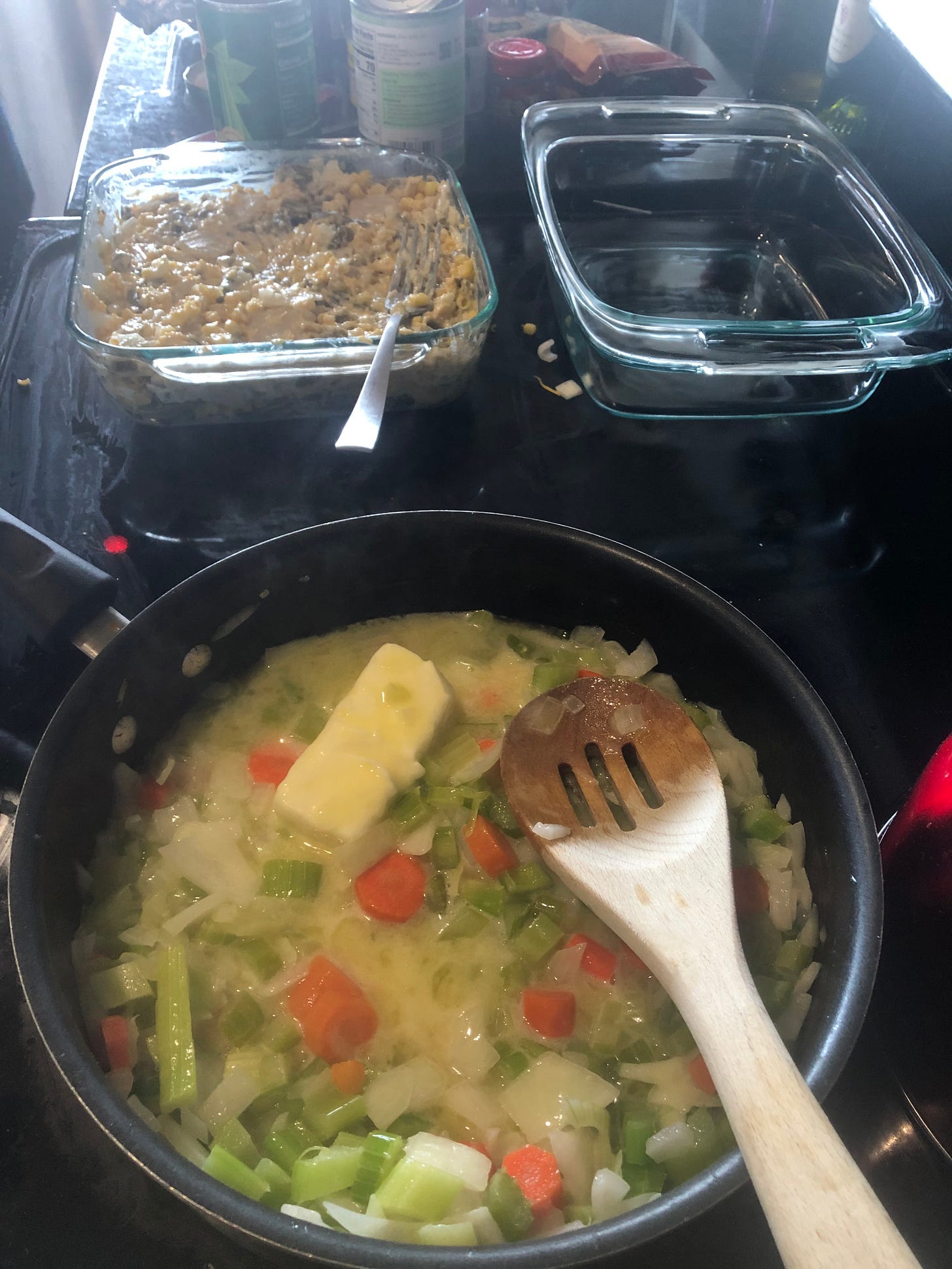During college and the first few years post grad, I spent every Thanksgiving in Chicago with my family. On Wednesday, I would fly in and go out with all my high school friends on Lincoln Avenue (shout out to Irish Eyes). Thursday was Thanksgiving with my family. Friday, my Mom and I would cook Turkey soup with the leftovers. And on Saturday, we had a second Thanksgiving with our neighbors and would serve the soup as the main course.
However, about 5 years ago, I slightly diverged from the plan. My best friend, Lucy, and I flew in late Wednesday night, so we couldn’t participate in our typical pre-Thanksgiving traditions. While we were extremely disappointed, we reached out to all our friends and asked if they would be up for going out again on Friday. Everyone agreed and was excited to meet back out.
That night, we stayed out till 4am... When we finally got home, we were famished and decided to scavenge for food while the whole house was still asleep. And that’s when we saw it - the soup. Lucy said,
“It’s literally 2 gallons of soup, no one will ever notice if we have a few bites.”
Next thing I knew, we were both on the floor eating the soup directly from the pot. About 30 minutes later, my mom came into the kitchen and screamed, “OMG, you ate the whole thing?” I swear we gave Joey Chestnut a run for his money that night, and yes we ate the whole thing.
And that leads me to today’s topic, ESG Investing. Because sometimes, we can’t just keep taking from the pot. Sometimes we need to do the right thing and give a little back.
WTF is ESG Investing?
Environmental, social and governance, or ESG investing, is a form of sustainable investing that considers an investment’s financial returns and its overall impact.
What Does ESG have in common with Turkey Soup?
They make you feel good - I’m not sure there is anything better than good food after a long night out. ESG investing is also gaining popularity because of how it makes investors feel good. Companies with better ESG scores are not only outperforming those with lower scores, they make investors feel better about their positive impact.
They are HOT - I know this is probably one of my weaker jokes, but soup is HOT (or at least it is better consumed warmed up). ESG investing is also incredibly hot right now. In fact, U.S. assets under management leveraging ESG strategies grew to $17.1 trillion by the beginning of 2020 which is a 42% increase from $12 trillion at the beginning of 2018. Essentially, this means that retail and institutional investors are making more conscious investment decisions causing companies to be more mindful of their own impact and the practice is only getting more popular.
Lots of Different Ingredients - One of the reasons my mom was so upset about the soup was the complexity of it. Every year, we add tons of veggies, spices and secret ingredients (butter) which makes it unlike any other soup I’ve ever had. ESG companies also have many different factors. In fact, an ESG company is evaluated on 3 main factors. A company is then given a score based on the factors below:
Environmental: First, we review environmental factors. This can include how a company mitigates its greenhouse gas emissions, whether the products they create are sustainable, if they use natural resources efficiently, if they recycle, and how much waste they produce.
Social: The second factor is social components. This can include assessments like, does the business participate in community development, do they consider diversity and equal employment opportunities for hiring, do they provide benefits for parents, and how do they treat human rights inside and outside the organization.
Governance: Governance (or corporate governance) refers to the company’s leadership and board, including whether executive pay is reasonable, if the company’s board of directors is diverse and whether it’s responsive to shareholders.
Note: If you want to check out a company’s ESG score, you can search the company name here: sustainalytics.
Performance: As I said earlier, Lucy and I gave Joey Chestnut a run for his money with our soup eating skills. 2 gallons under 30 minutes? I would like to see someone else try that feat. ESG investments have a similar impressive track record. In a recent study conducted by Morgan Stanley, they found that ESG funds consistently had similar or better performing returns as traditional funds. For example, JUST U.S. Large Cap Diversified Index (JULCD), which includes the top 50% of companies in the Russell 1000 (a large-cap stock index) based on their ESG rankings. Since its inception, the index has returned 15.94% on an annualized basis compared with the Russell 1000’s 14.76% return.
How Do I Invest in ESG Companies?
Individual Stocks - If you want to invest in ESG companies, you can do this by opening a brokerage account and analyzing individual stock ESG scores. You can do this by checking a companies ranking on sustainalytics or searching the following list for highest performing ESG companies.
ETFs & Index Funds - If you want to gain access to ESG companies, you can start by opening up a brokerage account and searching for ESG funds. Some of the top funds for 2021 are here. This essentially means, you are investing in a group of companies with higher ESG rankings which are chosen by an asset manager.
Robo Advisors - If you are interested in investing with an ESG focus but don’t want to spend the time picking stocks or individual funds, you can have a robo advisor do it for you. Check out some of the top ESG robo managers here. Tardi will also be offering this, so join the waitlist here if you are interested.
Wealth Management - If you already have a wealth advisor, ask them what offerings they have for responsible investing. Your broker may offer both public and private equity options for investing.
Things to Be Mindful Of
Scoring System - ESG Investing is relatively new. Therefore, the scoring systems we use are not necessarily standardized. This means, you might review scores on different sites and the results may differ. Although we are moving towards standardization, this is taking time, so make sure to do your due diligence on companies and consider checking multiple sources.
ESG Investing versus Impact Investing - ESG investing is a form of sustainable investing that considers an investment's financial returns and its overall impact. Essentially, every company has an ESG score. If you do conscious ESG investing, you consider these scores when making a decision. On the other hand, there is impact investing. This is the act of using money and investment for positive social results. For example, Facebook has a positive ESG score but is not an impact company. On the other hand, companies like Brandless and Bombas are impact companies as their bottom line has to do with making a positive impact. Essentially, an impact company will always have an ESG score, but a company with a high ESG score is not necessarily an impact company.
Lower Risk - Companies with higher ESG scores tend to be less risky investments. In a recent study by Morgan Stanley, they found that sustainable funds consistently showed a lower downside risk than traditional funds, regardless of asset class.
Identify What Matters to You - Although most ESG ranking systems will give you an overall score, its important to consider all 3 factors and which ones matter most to you. For instance, let’s say you care most about the environment and there are 2 companies with the same ESG score. One, however, might have a higher environmental score while the other has a higher social impact score. Given your preference, you may want to choose the company with the higher environmental score.
Remember Fundamentals - Although it is clear retail and institutional investors are trending towards ESG investing, it is important to analyze stocks holistically. Remember the article here about how to pick a stock and conduct proper overall due diligence. Just because a company has a high score doesn’t automatically make it a good investment in terms of return.
What’s next?
Thank you for reading!! If there is a topic you want to discuss, please DM me on Instagram at @notyourbfsinvestmentadvice or email me at kelsey@tardiapp.com. I also am building a company called Tardi - a financial wellness and investment platform. If you’re interested in joining the beta, sign up here: https://www.tardiapp.com/
See you next week lover!
Disclaimer: All investment strategies and investments involve risk of loss. Nothing contained in this website should be construed as investment advice. Any reference to an investment's past or potential performance is not, and should not be construed as, a recommendation or as a guarantee of any specific outcome or profit.









I love impact investing. 😊🥰💚